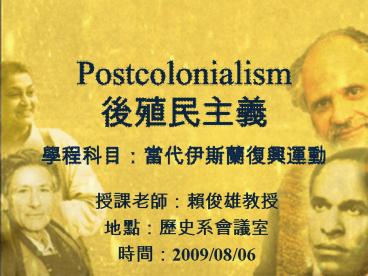Postcolonialism - PowerPoint PPT Presentation
1 / 18
Title:
Postcolonialism
Description:
... in 1943, when he volunteered to fight with the Free French in World War II, ... works include Nation and Narration (editor 1990) and The Location of Culture (1994) ... – PowerPoint PPT presentation
Number of Views:337
Avg rating:3.0/5.0
Title: Postcolonialism
1
Postcolonialism?????
?????????????
- ?????????
- ????????
- ??2009/08/06
2
??
- ??
- ???????
- ????????
- ?????????
- ???????
- ????????
3
????/Preface
- ????????What is postcolonialism?
- it loosely designates a set of theoretical
approaches which focus on the direct effects and
aftermaths of colonization. More specifically, it
is the social, political, economic, and cultural
practices which arise in response and resistance
to colonialism. Major postcolonial theorists
include Fanon, Said, Spivak and Bhabha.
4
??Frantz Fanon/??
- ??
- Fanon (1925 1961) was born in 1925, to a
middle-class family in the French colony of
Martinique. He left Martinique in 1943, when he
volunteered to fight with the Free French in
World War II, and he remained in France after the
war to study medicine and psychiatry on
scholarship in Lyon. Here he began writing
political essays and plays.
5
??Frantz Fanon/??
- Facing the brutal reality of colonialism
directly, Fanon (a psychiatrist, critic and war
hero), in Black Skin, White Masks, contends that
the colonial and white superiority forces the
black people to see their color of skin with
negative and demeaning associations.
6
??Frantz Fanon/??
- Accordingly, the desire to identify with their
white colonizer has lead to the painful splitting
of their identity into two selves one, white
mask, which speaks the language as if it were
the authentic aspect of his identity, and the
other, black skin, which realizes this
linguistic identity as a theatrical self and a
form of colonization in order to free his
desiring machine, fighting against the fascism
planted in his head the dogged pursue of
Frenchness.
7
?? Edward Said/???
- ??
- Said (1935-2003), a Palestinian-American literary
theorist, cultural critic, and an advocate for
Palestinian rights, was born in Jerusalem when
the city was part of British-occupied Palestine.
His family fled with other Palestinian refugees
to Cairo when Israeli forces captured West
Jerusalem in 1948. He eventually attended
Princeton and Harvard and settled in the U.S.,
where he became a professor of comparative
literature at Columbia University and
Palestines most powerful political voice.
8
?? Edward Said/???
- Said, in Orientalism and Culture and Imperialism
develops an ethico-political critique. His
cultural schizoanalysis tears down the long-term
images, stereotypes and general ideology about
the Orient as the Other or the colonized,
constructed by generations of Western scholars
who produced myths about the laziness, deceit and
irrationality of Orientals. Thus, what the West
wants to conquer and colonize is not the real
East but the mere imaginary East of the West.
9
??Gayatri Chakravorty Spivak/????
- ??
- Spivak (1942-) is an Indian literary critic and
theorist. She is best known for the article Can
the Subaltern Speak?, considered a founding text
of postcolonialism, and for her translation of
Jacques Derridas Of Grammatology. Spivak teaches
at Columbia University, where she was tenured as
University ProfessorColumbia's highest rankin
March 2007. She is also a visiting faculty member
at the Centre for Studies in Social Sciences,
Calcutta.
10
??Gayatri Chakravorty Spivak/????
- Spivak calls for strategic essentialism to
replace the binarism-oriented radical
postcolonialism. Elsewhere, and especially in
Can The Subaltern Speak?, she problematizes the
notion of subaltern or marginality. To her,
marginality is a very troubling notion because of
its unsaid desire for replacing the center.
11
??Gayatri Chakravorty Spivak/????
- Furthermore, it is also an accomplice of the
center. Accordingly, she advocates strategic
essentialism or the strategy of catachresis as
the practical politics of the open end, a
method of the reversion, re-description,
displacement and insertion of Culture and History.
12
??Homi K. Bhabha/??
- ??
- Bhabha (1949-) is an Indian postcolonial
theorist. He currently teaches at Harvard
University where he is the Anne F. Rothenberg
Professor of English and American Literature and
Language and Director of the Humanities Center.
His major works include Nation and Narration
(editor 1990) and The Location of Culture (1994).
13
??Homi K. Bhabha/??
- From the perspective of the openness and
ambivalence of analytic structure, Bhabha, like
Spivak, also deploys, in the British context, a
more specifically poststructuralist repertoire
(Foucault, Derrida and a latter-day version of
psychoanalysis) for his anti-oedipus exploration
of colonial discourse.
14
??Homi K. Bhabha/??
- Bhabha proposes the notion of relocation as a
transformative instrument to grasp the
in-betweenness in the ambivalent field the
gray zone of intersection in which all culturally
determinate significations are being questioned
by an aporia-like hybridity between the colonist
and the colonized.
15
??Saids Orientalism ????????
- ????????????????????????????????????????????
- ????????????????????????? ???,????,???????????????
????????? ????????????????????????????-?????
?????????????-???????????????????? ??????????
????http//life.fhl.net/Philosophy/bookclub/cultu
re/01.htm
16
??Saids Orientalism ????????
- ????????????????????????????????
??????????????????????????????????
????????,??????????????,??????????
??????,????,????????????-?????????
???,??????????????????????????????
????????????????????????????????????,????????????
????????
????http//life.fhl.net/Philosophy/bookclub/cultu
re/01.htm
17
??Saids Orientalism ????????
- ?????????????????????????? ??????????????????????
???????,??? ???????????????????????????????????,??
???????????????????????????,??????????????????????
??????????????, ???????????????(hegemony)?????????
??? ????? - Stop and Ponder
- ????????????????????????????????
- ???????????????????????????????
????http//life.fhl.net/Philosophy/bookclub/cultu
re/01.htm
18
???!!































